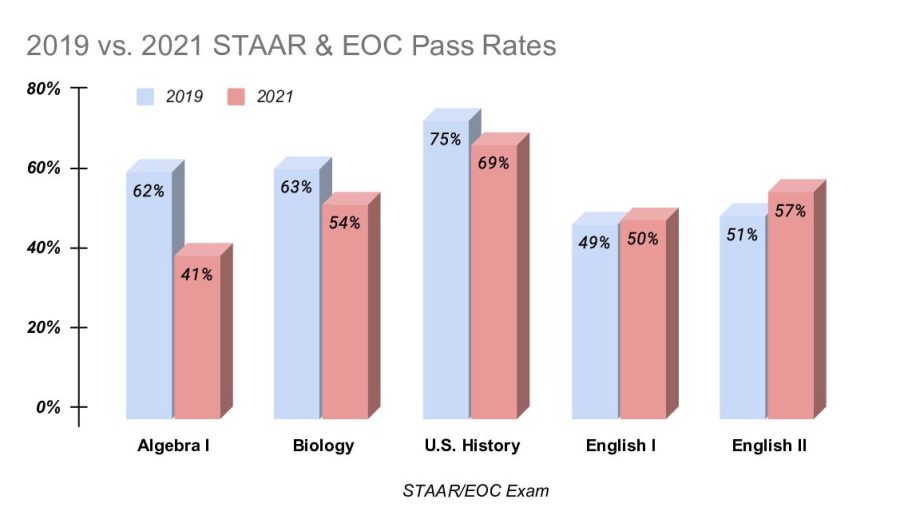State-mandated tutoring causes controversy
TEA decision to require additional for failing STAAR scores leads to parent and student frustration, confusion
A comparison of statewide 2019 and 2021 STAAR and EOC pass rates based on TEA released data. Due to COVID, STAAR exams were canceled in spring 2020. Algebra I had the most severe difference in scores, with 62% of students passing in 2019 and only 41% passing in 2021. English STAAR I and II pass rates increased by 1% and 6% respectively. Accelerated instruction is still required for students who failed to pass those exams.
February 25, 2022
After what was widely regarded as a controversial decision to continue with STAAR testing last school year, the Texas Education Agency enacted House Bill 4545 in order to compensate for higher failure rates, which are assumed to be in part caused by the pandemic and online learning.
House Bill 4545 was passed in June and put in place mandatory “accelerated instruction,” or tutoring, for students who failed STAAR or EOC exams in the spring. It requires a minimum of 30 hours of instruction per subject failed for each student. It is meant to be organized at the district and campus level.
At McCallum, the tutoring is offered during FIT (which is currently on hold due to COVID), before and after school, during lunch and at Saturday school. Teachers have been assigned to small groups of students, per the TEA’s guidelines.
According to administrators, the substitute and subsequent teacher shortage does not seem to be affecting the tutoring groups.
Parents have expressed frustration and confusion over this tutoring. McCallum parent Sandy Bootz opted her son out of STAAR exams last spring because of personal opinions concerning STAAR tests and because she believed it was an option without penalty for her student. She still received notice that her son would be required to complete tutoring hours. Her son missed the make-up Beginning of Year, or BOY, Assessment, thus causing him to not meet the grade-level requirements according to TEA.
“There are so many problems with this legislation,” Bootz said.
Freshman Livi Moore, one of the students who opted out of a STAAR test last year, must stay after school for one hour each week for tutoring instruction. Multiple options for times and methods to complete the tutoring were presented when Moore’s mom received an email at the beginning of the school year.
“I’m having to stay at school for another hour,” she said, “when I could be using that time to be studying, or doing anything else with my life, rather than doing something I view as unnecessary.”
Moore is still unsure as to why she is involved in the tutoring.
“I’m the only one I know who’s doing it,” she said. “From my knowledge, my beginning of the year [assessment] was graded highly. I’m still so confused about why I qualified for it.”
Additionally, other students that Moore went to school with last year who opted out of STAAR tests did not qualify for the tutoring.
For freshmen like Moore and the son of Sandy Bootz, the confusion surrounding the mandatory tutoring is combined with the chaotic transition to high school. Lower STAAR pass rates were reported in subjects such as Algebra I, which is often taken by middle school students who are ahead on their math track. These students who failed, or chose to opt out, are now freshmen enrolled in the mandatory tutoring.
In past years, when students failed to reach the satisfactory level on standardized state tests, there have been several options depending on the grade of the student and subject area failed. These included the SLHM (strategic learning for high school math) and algebraic reasoning courses offered to those who failed math STAAR tests and EOC prep classes for upperclassmen who failed English tests.
This year, the only options are to take a BOY exam or participate in the 30 hours of mandatory tutoring. Many students who either opted out or failed a STAAR test are forced to choose the latter due to missing the BOY tests entirely.
Assistant principal Sophia Sherline has been helping parents to understand the implications of House Bill 4545 for their individual students.
“TEA thinks that this is the most effective way of making up for not passing the STAAR tests,” Sherline said. “Personally, I do not know what the most effective way is. But I do know that we have students that missed out on some learning last school year, and this tutoring should help with that.”
TEA has also attempted to provide parents with clarity and explanations by releasing informational videos and an FAQ about House Bill 4545 on the TEA website.
Teachers are working with students to complete the 30 hours, like English teacher and curriculum coordinator James Hutcheson. The goals are to align student learning with TEKS laid out by TEA. Students also take diagnostic tests in order for teachers like Hutcheson to get a better understanding of where their strengths and weaknesses lie. Most of the instruction is accomplished through the use of online programs like IXL.
“I think that there are better ways of achieving these goals,” Hutcheson said. “Unfortunately, those ways would take way more time and money than we have.”
Hutcheson has noticed frustration within the students in his tutoring group as well.
“Most aren’t too thrilled to give up 30 hours of their free time,” he said.
STAAR scores are used as a tool to measure student learning and to determine if they are fit to progress to the next grade level. They are also a way of allocating funding, so despite family and educator concerns, it is unlikely that the TEA will repeal House Bill 4545 or the tutoring.







